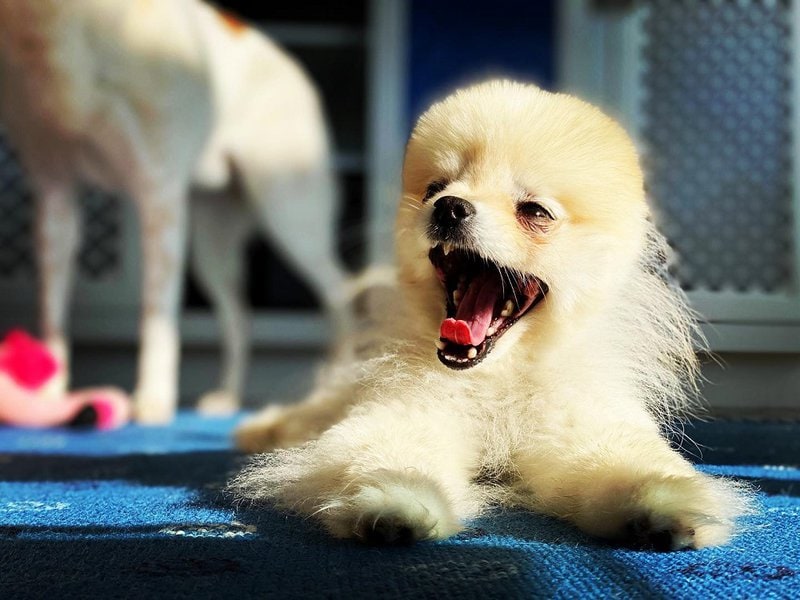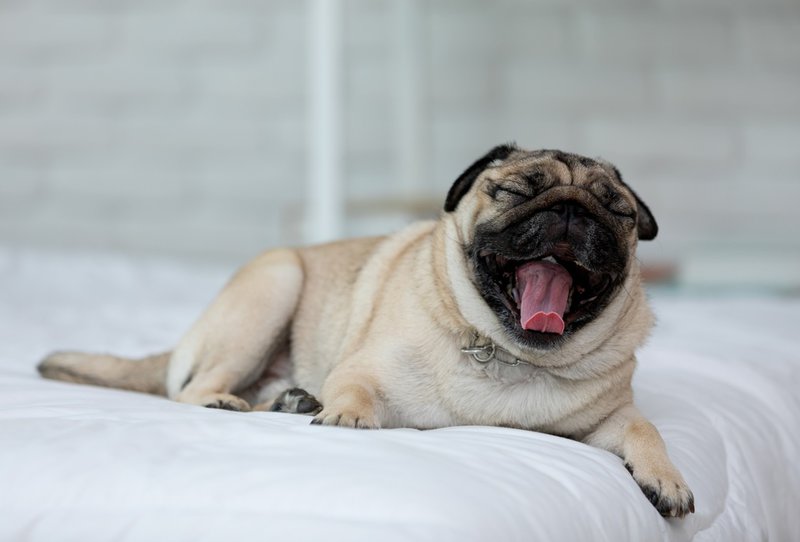Most humans yawn out of boredom, but a yawning dog may be trying to communicate. Dog yawns are interesting as they don’t worry about hiding their yawn behind a paw to be polite. They are similar to human babies and other animals. So, why do dogs yawn?
When dogs yawn, it’s an uninhibited full-on jaw stretch followed by a big deep breath. It’s perfectly normal for dogs to yawn a lot, as they often do this to deflect a threat and occasionally as a response to stress or anticipation. For instance, your pooch may yawn while waiting at the vet or anticipate something enjoyable like a walk. Yawning is a dog’s way of controlling its enthusiasm.
However, yawning in dogs can communicate different messages about what your dog is currently feeling. So what is your dog trying to communicate when they let a loose yawn during training, right before bedtime, or in the car? Let’s read on to learn the strongest theories about why your dog might be yawning and if it’s anything to be alarmed about.
Why Do Dogs Yawn?
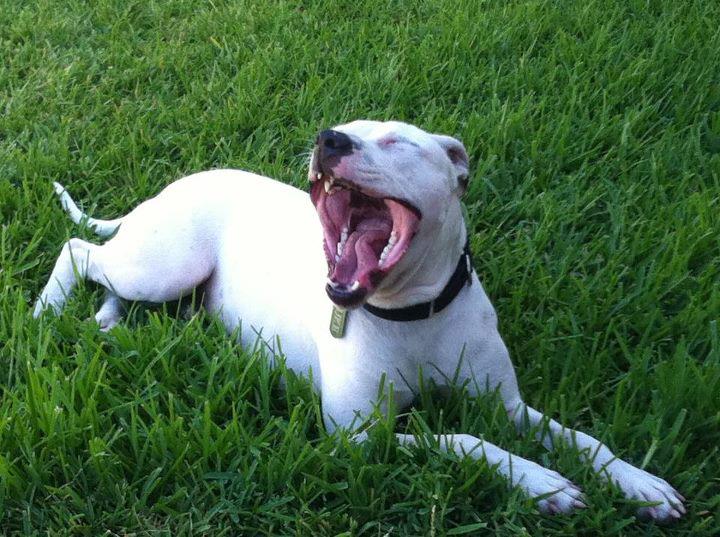
Every dog yawns for different reasons, and therefore it isn’t easy to get a convincing answer that will apply to all. For instance, dogs usually yawn when you play or pet them, and you might not understand for sure.
Although the exact reasons why dogs yawn may be unknown, there are a few theories about why they yawn, and most of them are nothing to be worried about. When you study your dog’s reaction and the situation in general, you can be able to guess what makes your dog yawn.
What Is A Dog Yawn?
The act of a dog yawning is the same as that of a person yawning. It is a reflex action where the mouth opens wide, and the lungs inhale involuntarily. Since its involuntary, there is no way you can control the aspect of a yawn when it happens and how long it will last. This is true for both dogs and humans.
Some dogs make sounds when they yawn, a high-pitched sound of exhaling, and others yawn silently. Of course, there are times when yawns are just yawns but sometimes, to understand the real meaning of a yawn, you should observe the situation.
Some of the reasons dogs yawn include:
Stress And Anxiety
Your dog yawning could be a sign of negative emotions such as anxiety and stress. Other signs of nervous body language that follow this yawning include tense muscles, lip licking, wide eyes, and flattened ears. Notably, there are more indications that your pooch is uncomfortable with a situation, but the above are the main ones.
To know if your dog is yawning due to anxiety and stress or not, you should pay attention to when the behavior happens. For example, if your pooch continually yawns when heading to a vet while in the car, it might mean that they are yawning because they are nervous or anxious.
If you think your dog is yawning because of stress, it is advisable to take a break from current exercises or take it for a private walk at a dog park. This should cease the yawning if anxiety and stress were the cause.
To Avoid Conflicts
Some dogs yawn to avoid disputes or adverse situations. For example, when your pooch meets a larger or more violet dog, it might yawn to indicate it doesn’t want trouble. It’s another way to tell the other dog to stay calm and have a peaceful time together.
Likewise, if you notice your dog licking another dog on its snout, it is a submissive way to inform the other dog, “I mean no harm.”
In addition, this is a response your pooch will give you when it does something wrong and knows you will rebuke or punish it for the behavior. Dogs usually yawn to indicate appeasement, showing their willingness to obey and hoping to calm the dog owner.
When your pooch breaks or chews your rug, it may yawn to alleviate tension and try telling you to relax. However, you shouldn’t be angry that your dog is disrespectful or trying to ignore your words. Instead, they are trying to tell you to take it easy.
When Excited
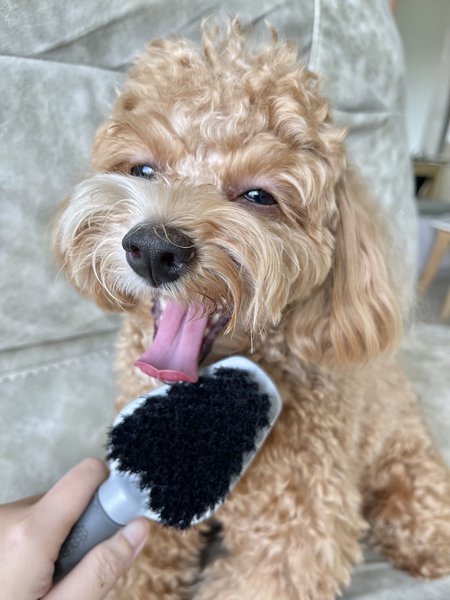
Dogs often yawn when you talk or pet them because they are happy you have given them attention. However, some dog owners may think it is because they are bored with you, which is not the case.
Sometimes, your pooch may yawn in the car while going to the vet or while you are taking them for a walk, and as much as this could indicate anxiety, it could also mean they are excited. Your pooch will continuously yawn to show their enthusiasm to spend time playing with you.
If your pooch yawns because of excitement, it usually indicates that it feels safe and delighted. Therefore, it is no cause for alarm if your dog yawns when you cuddle its head.
Yawning Is Contagious
Yawns are contagious, and they can develop between humans and dogs. Interestingly, dogs that follow a yawn from another dog or a human are better at socializing than those who don’t.
Therefore, these dogs should display a great bond with others by being contagious to yawns. Contagious yawning improves the relationship between humans and dogs, making the process of maintaining your dogs smoother.
When Tired And Confused
Like humans, yawning because you are tired is a common reason. This might mean that your dog is sleepy after having fun and playing the whole day. However, a tired pooch will mean a happy one, so you will know they had a good day if you see them yawn.
On the other hand, your dog may yawn when confused and may not know what it should do next, and this may happen especially during training. For example, you could be giving your dog a command, but your pooch may not be sure when you want it.
When you repeat a command, it will worsen the situation, and the more you repeat your command, the worse you make the situation become. For example, when your dog is yawning, it could be not because they are bored with training or about to fall asleep. Instead, your pooch might not know what it is, yet you expect them to do something.
To Communicate With Other Dogs
Dogs usually communicate with each other in several ways. Yawning is a calming signal and something dogs use for the introduction. Other signs may include licking their strolling nozzle and turning your eyes away.
When your pooch shows one of the above behaviors to another dog, it is a way to welcome them. Dogs use calming signals with each other, and it helps them interact with humans. For instance, when you approach your pooch, try to yawn back at them as a way to tell your pooch you are not a threat.
Is Your Dog Yawning A Bad Thing?
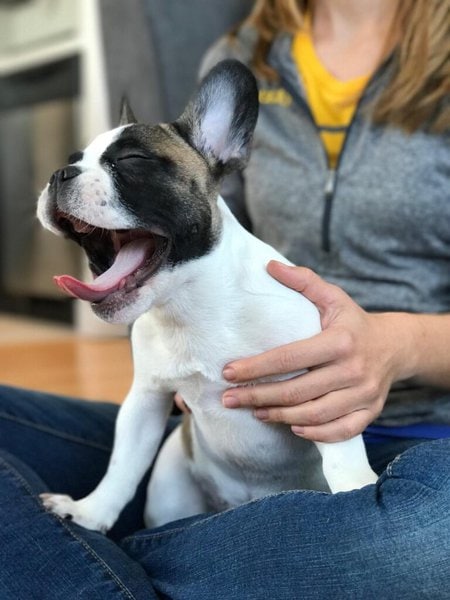
Yawning is normal behavior for both dogs and humans. However, as with humans, you can expect occasional yawns when your pooch is tired, and it should be a cause of any concern.
However, some situations should make you a bit worried, and it might be a sign that your pooch should take a break or calm down. Taking a break or calming down can be corrective, especially for dogs with situational anxiety.
Nevertheless, this can be a challenge if it happens in your home. So, if you find that your pooch yawns a lot in the home, it might be the best time to check if your home has any potential triggers.
In addition, the stress in dogs can be triggered by a sudden environmental change such as the sudden absence of a loved one, new pets in your home, and many others. Identifying your dog’s anxiety could help you bring your pooch comfort. It can also help to end frequent yawning.
If you can’t find the cause of your dog’s stress, it may be advisable to consult a veterinarian or a professional trainer for guidance. Partnering with a professional can help develop strategies to help your pooch cope.
Professional consultation is important because, in some rare circumstances, excessive yawning can be a symptom of an underlying disease like multiple sclerosis.
When Is Yawning A Cause For Concern?
Yawning in dogs is an enigma, as it is in humans. You can’t stop the yawns for both dogs and humans because they are natural. Since dog yawns are normal, 99% of the time, the yawns are nothing to worry about.
However, when you notice your pooch is yawning more than usual in some situations, you should try to figure out why. First, check if there have been any significant changes in its life. If there have been significant changes in his environment, try to make its environment less stressful.
If there have been no changes to its life, then you might need a vet appointment to determine why your pooch is yawning more than normal. Notably, consulting an animal behaviorist or a vet about excessive yawning even after you have made changes in its environment is important.
Are Dog Yawns Contagious To Other Dogs?
Dogs mirror their owners when they yawn but are they contagious from one dog to another? Studies show that dogs yawn after their owners to show empathy, so it is normal to wonder if it’s the same from one dog to another. While it may not be easy to know, some evidence shows it may.
According to a recent study, contagious yawns are more common in stressful situations. For example, shelter dogs in the study often caught contagious yawns from each other, and it didn’t happen for dogs in a calm situation.
The study suggests when dogs mirror another dog’s yawns, it could be an effort to sympathize with it. However, yawning could result from the high-stress levels of each dog. Although yawning in dogs is a behavior that we might never understand fully, and research is helping to develop potential causes, it is still a mystery for humans and animals.
Can You Stop Your Dog From Excessively Yawning?
Like human yawns, most dogs will also yawn when tired or bored, but it’s nothing to worry about. If your dog is tired, you should allow your pooch to go to bed because dogs sleep a lot.
In addition, allowing your dog to choose is very important for anxious, fearful, or stressed dogs. It is important never to force your pooch to interact with a child, a person, or another dog.
If you prevent your pooch from leaving a situation or allowing a person to continue, the approach could worsen the situation. The dog may have to use overt signs of anxiety, fear, and stress to ask for some distance, such as biting, growling, and snapping.
There are some simple and basic things you can do to help your pooch curb its yawning behavior from happening more frequently, including:
- Create a safe space for your dog. For example, you can give your pooch a quiet room with some background noise, furnish it with the best dog beds and use a nice blanket to add some coziness.
- Choose a great selection of the best dog toys, special treats, and puzzles for your pooch to play with. The soft and snuggly goods are especially good for popping into your bed or crate at night and when you leave the house.
- Avoid stressful situations that can cause fear in your dog. For example, try to leave your dog at home when you attend crowded or loud events such as a parade or a fireworks show.
- Learn your dog’s signs of anxiety, fear, and stress to help your pooch feel safer. Move your dog far away from anything that scares it, and you could also ask any approaching stranger to stop their approach. Always take a yawning dog to quiet locations with few scary stimuli.
- If your dog struggles with stress and fear in its everyday life, you can help it feel less fearful of the triggers through a science-based modification. It might involve positive associations, rewarding, and teaching new behaviors. Some cases may involve utilizing anxiety management to assist your pooch in feeling better and easier learning. You can use a veterinary behaviorist or a trainer to help you with training.
